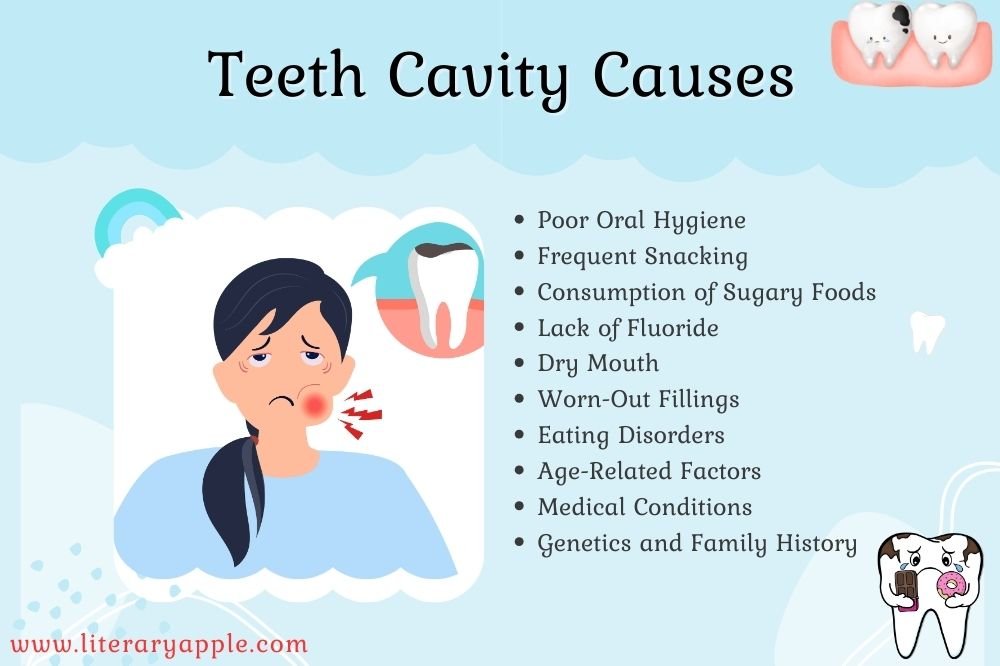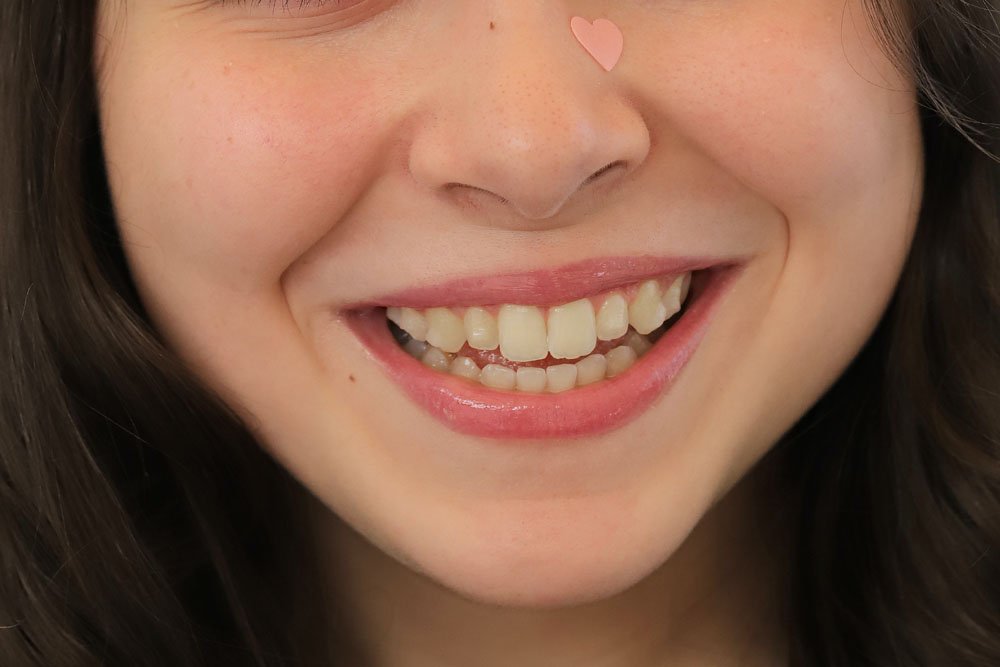Teeth Cavity: Causes, Symptoms, and Treatments

Teeth Cavity: Causes, Symptoms and, Treatments
Teeth Cavity: Causes, Symptoms, and Treatments
Teeth cavity is one of the most frequent health disorders among people of all ages, from children to adults. The cavity of teeth is not in-curable. In this article, we will discuss how tooth cavity occurs and what you can do to effectively treat them. In addition, several methods for preventing future cavities from occurring are mentioned.
Teeth cavity or tooth decay is actually an infection of teeth in which a black hole appears in your tooth. This hole starts small and if left unchecked or untreated, it increases in size and can cause severe pain. When the cavity is small, you would not notice because it causes no pain at all. This can be a problem if you do not have a healthy oral routine. The cavity would have done enough damage before you discover its existence. Regularly visiting a dentist can be helpful in detecting cavities at their early stage.
Types of Teeth Cavity
All teeth can get affected by teeth cavities. Tooth decay has the following types:
Smooth surface: The tooth enamel is dissolved by this slowly expanding hole. Through correct brushing, flossing, and dental cleanings, you may stop it from happening and can occasionally turn it around. This type of tooth cavity affects people in their 20s the most.
Pits and fissures decay: On the upper portion of the tooth’s chewing surface, cavities develop. The front side of teeth is susceptible to decay as well. Pit and fissure deterioration typically begins in puberty and advances swiftly.
Root decay: This type is very common among older people. They have receding gums so root decay affects them significantly
Teeth Cavity Can Have the Following Symptoms
Sometimes, there are not any symptoms. A tooth cavity can start as a small hole, which is painless. However, even though it is painless you should still go to a doctor for treatment. It can turn bigger and worst if left unattended.
- Toothache, sudden pain, or pain that develops for no clear reason
- Sensitive teeth
- When eating or drinking anything sweet, spicy, or cold, there may be mild to severe discomfort.
- A brown, black, or white stain on any tooth surface.
- When you bite down, it hurts
- Having a smelly breath
- Bad mouth taste
- Mouth discomfort or tooth pain.
- Sensitivity of teeth to hot or cold beverages and meals.
You should look for any teeth cavity if you find these signs
Main Causes of Teeth Cavity
Cavities can arise due to a variety of circumstances. Usually, these processes take place:
- Mouth bacteria consume starchy, sugary foods and beverages (fruit, candy, bread, cereal, sodas, juice, and milk). These carbohydrates are changed into acids by the bacteria.
- When the bacteria, saliva, acid food, and saliva combine they can be the reason for plaque formation. The teeth are covered in this gooey material.
- Plaque acids destroy tooth enamel if you do not brush and floss properly. It leads to cavities or holes in your teeth.
Treatments for Teeth Cavity
Your chances of catching a tooth cavity in its tracks and reversing its early stages are stronger the earlier you seek treatment. You usually won’t require significant treatment if you address teeth cavity before it starts to hurt.
- Fluoridation processes
- Fillings
- Crowns
- Root canal
- Extractions of teeth
Fluoride treatment: A fluoride treatment may help rebuild the enamel on your tooth. It works if your cavity is in its early stages. Sometimes it can also restore a tooth’s enamel. Fluoride is present significantly in fluoride treatments.
It is also present in tap water, mouthwash and toothpaste but in low quantity. Fluoride can be applied to your teeth as a liquid, gel, or foam.
Fillings: When teeth cavity has advanced past the first stage, fillings are the primary treatment choice. Fillings come in various types. Tooth-colored composite resins, silver material, and fillings are made by combining lots of materials together.
Crowns: A specially fitted covering substitutes the complete natural crown of your tooth. If you are facing a severe cavity of teeth, a crown is essential. The entire decaying region and just enough healthy tooth tissue are removed by your dentist during drilling to guarantee a comfortable fit.
Root canal: You could require a root canal if decay has spread to the tooth’s core. Instead of extracting a severely decayed or broken tooth, this procedure repairs and saves it. The infected tissue of the tooth is removed.
Tooth extraction: Some teeth develop severe decay to the point where they cannot be repaired. This type of tooth cavity must be removed. A gap left by a tooth extraction could cause your other teeth to move freely. If a bridge or dental implant is an option, think about obtaining one to replace the lost tooth.
Complications of Tooth Cavity
Teeth cavities should be taken seriously. A tooth cavity can cause many problems. These cavities can lead to many problems related to your mouth. Following are some main issues that can happen because of the cavity of teeth:
- Pain
- Tooth infection
- Pus or swelling around a tooth
- Teeth with damaged or broken
These can get severe over time if tooth cavities are left untreated. Some bigger problems include:
- Pain that makes regular life difficult.
- Troubled chewing and swallowing. It can cause extreme weight loss.
- Loss of teeth can affect your self-esteem.
- A tooth abscess is a pus-filled pocket caused by a bacterial infection.
There is a surprisingly large number of false beliefs about cavities of teeth and the holes they permanently create in your teeth. Some of the myths related to tooth decay are:
The Only Sources of Cavities Are Sweets & Soda
Cavities are brought on by the toxic acid, which is created when your normal oral bacteria feed on the carbohydrates in the meals you consume. All meals, including bread, spaghetti, crackers, and even nutritious foods like fruits, contain these sugars.
A Cavity of Teeth Can Be Filled and Forgotten
You must continue to take additional care to keep a cavity clean after it has been filled. Around fillings, plaque and germs frequently collect, increasing the risk of cavities in surrounding teeth.
Brushing Is Enough To Prevent Teeth Cavity
While using a toothbrush often helps to prevent tooth decay, it cannot remove the plaque and germs that are trapped between your teeth. You must floss between all of your teeth every day to prevent cavities from developing there and in other difficult-to-brush spots.
Cavity of Teeth Always Hurt
Only when cavities have burned through a sizable portion of your enamel and have reached the delicate layers below do they become painful and sensitive. Early tooth decay frequently does not present any signs that you can notice, so it might grow and advance without your knowledge.
Overview
Anyone can face cavities. The tooth cavity should be treated as early as possible. Much prevention can stop tooth decay. Visit the doctor twice a year to get your teeth examined. Keep your teeth safe from cavities. Happy reading!
You Might be Interested In…
- Make Your Hands Soft and Beautiful
- Treatments of Hyper-Pigmentation
- Get Fair and Glowing Skin at Home
- Get Your Lips Pink and Rosy
- How to Remove Nail Polish Easily
- Remove Ring From Swollen Finger
- Toothache Causes Symptoms & Treatments
- How to Make Teeth White Easy Tips
- Make Smile Attractive with Healthy Teeth
- Fractured Tooth Causes, Symptoms & Treatments
- How to Treat Fungal Nail Infection at Home
- Home Remedies for Dry and Cracked Heels


You May Also Like

Ginger Water Benefits: How it Can Do Wonders
26/08/2023
Islamic Concept of Sleep Paralysis
20/08/2023